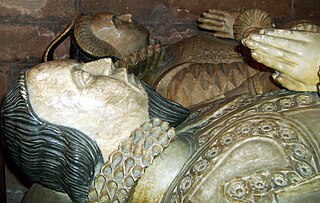See also
- Richard Leveson-Gower (1726–1753), MP for Lichfield
Richard Leveson may refer to:
George Anson may refer to:

Lichfield is a constituency in Staffordshire represented in the House of Commons of the UK Parliament since its 1997 recreation by Michael Fabricant, a Conservative.
John Leveson-Gower, 1st Baron Gower PC was a member of the Leveson-Gower family. He was the son of Sir William Leveson-Gower, 4th Baronet and his wife Jane Granville. He was born in Sittenham, Yorkshire. His maternal grandparents were John Granville, 1st Earl of Bath and his wife Jane Wyche, daughter of Sir Peter Wyche.

George Granville Sutherland-Leveson-Gower, 2nd Duke of Sutherland, KG, styled Viscount Trentham until 1803, Earl Gower between 1803 and 1833 and Marquess of Stafford in 1833, was a British Whig MP and peer from the Leveson-Gower family.
Richard Newport, 1st Baron Newport was an English landowner and politician who sat in the House of Commons at various times between 1614 and 1629. He supported the Royalist cause in the English Civil War and was created Baron Newport in 1642.
Henry Edward John Howard was an English Anglican clergyman who was Dean of Lichfield.
This is a list of the sheriffs and high sheriffs of Staffordshire.
William Burley was MP for Shropshire nineteen times and Speaker of the House of Commons of England.
Andrew Newport JP, styled The Honourable from 1642, was an English Tory politician, courtier and royalist.
Thomas Gresley may refer to:

Sir Richard Leveson (1598–1661) was an English politician who sat in the House of Commons from 1640 to 1642. He supported the Royalist cause during the English Civil War.
Leveson is a surname. The name as printed can represent two quite different etymologies and pronunciations:

Sir Richard Leveson was an important Elizabethan Navy officer, politician and landowner. His origins were in the landed gentry of Shropshire and Staffordshire. A client and son-in-law of Charles Howard, 1st Earl of Nottingham, he became Vice-Admiral under him. He served twice as MP for Shropshire in the English parliament. He was ruined by the burden of debt built up by his father.

John Giffard (1534–1613) was a Staffordshire landowner and Member of the English Parliament, notable as a leader of Roman Catholic Recusancy in the reigns of Elizabeth I and James I.
Sir Walter Leveson was an Elizabethan Member of Parliament and a Shropshire and Staffordshire landowner who was ruined by involvement in piracy and mental illness.

Sir Andrew Corbet was a prominent English Protestant politician of the mid-Tudor and early Elizabethan periods: a member of the powerful Council in the Marches of Wales for a quarter of a century. Drawn from the landed gentry of Shropshire and Buckinghamshire, he was twice a member of the Parliament of England for Shropshire.
Sir Richard Corbet (c.1545–1606) was an English landowner and politician of the Elizabethan period.
Sir John Leveson was an English politician. He was instrumental in putting down the Essex rebellion of 8 February 1601.

Brigadier-General Richard Leveson, 12 July 1659 to March 1699, was the son of a wealthy merchant from Wolverhampton, who served in the army of James II until the November 1688 Glorious Revolution, when he defected to join William III. He fought in Ireland and Flanders, sat as MP for Lichfield and Newport, and was Governor of Berwick-upon-Tweed from 1691 until his death in March 1699.
Francis Nicolls may refer to: